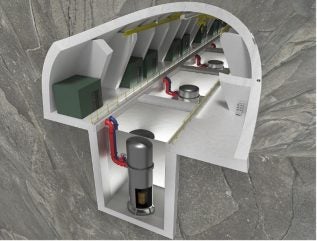
Finnish energy utility Keravan Energia has signed an agreement with Steady Energy Oy, a start-up company spun out from the VTT Technical Research, to develop nuclear-powered district heating based on small modular reactor (SMR) technology. Kerava is the third Finnish city to take this path following earlier initiatives by Kuopio and Helsinki. If the project proceeds to investment, construction could begin as early as 2029 for operation in 2032.
In Eastern Finland’s Kuopio nuclear heating is already in pre-investment phase, with zoning and environmental permitting starting soon. Finnish energy group Helen established a nuclear energy programme in September and preparation for a SMR heating project in Helsinki is now beginning. Helen already has a letter of intent with Steady Energy, but is also considering other possible SMR suppliers.
“We have a strategic goal to reach carbon neutrality by 2030,” said Jussi Lehto, CEO of Keravan Energia. “To achieve this, we need to minimise our emissions affordably and ensure that our city’s energy supply remains secure in all circumstances.”
The agreement is a first step towards evaluating the feasibility of deploying SMR technology in Kerava. The next step will include assessing site suitability, licensing, zoning, and the technical and economic viability of a nuclear heat plant tailored to Kerava’s energy needs.
“Think of district heating as a large system of hot water pipes, where heat flows to radiators from a giant boiler, where the heat source now is biomass and peat,” explained Lehto. “While green electricity is a good back-up, we need more stable solutions to counter electricity price volatility. A dedicated nuclear heat source, like Steady Energy’s reactor, is a very viable option.”
Steady Energy CEO Tommi Nyman said: “Keravan Energia has long been at the forefront of the energy transition. We’re thrilled to bring Steady Energy’s SMR technology into its growing portfolio of green solutions.”
He added: “The climate crisis won’t abate until we heat our homes cleanly. Globally, over 80 percent of energy still comes from fossil sources, with nearly half of that going towards heating and cooling. Finnish energy companies are taking the lead in moving away from combustion-based energy altogether.”
Steady Energy is seeking to construct a heating plant in Finland based on its LDR-50 reactor technology. The LDR-50 district heating SMR has been under development at VTT since 2020. It is designed to operate at around 150°C and below 10 bar (145 psi).
The LDR-50 reactor module comprises two nested pressure vessels, with their intermediate space partially filled with water. When heat removal through the primary heat exchangers is compromised, water in the intermediate space begins to boil, forming an efficient passive heat transfer route into the reactor pool. The system does not rely on electricity or any mechanical moving parts, which could fail and prevent the cooling function. The innovation was awarded a patent in 2021.
Nyman emphasised the simplicity of the system: “Heating water to 150 degrees accounts for 10% of global emissions. Our reactor focuses solely on this task, making it possibly the world’s simplest commercial nuclear reactor. This design ensures that SMR-produced heat is cost-competitive compared to other alternatives.”
Steady Energy’s initial market focus is Finland and wider Europe, but the company also envisions its reactors addressing industrial steam and desalination needs globally. “Each reactor costs €100m ($109m), and Europe alone could quickly need 300 of these units. There is a need for another 300 if we are to decarbonise desalination as well as industrial heat production,” Nyman said.
Steady Energy will start constructing a pilot plant in Finland next year, where its functionality and Steady Energy’s project management capabilities will be tested. The pilot, which will differ from an actual reactor only in that it will use an electric heater instead of nuclear fuel, will pave the way for further installations. Possible locations include Helsinki, Kuopio, Espoo, and Lahti.






